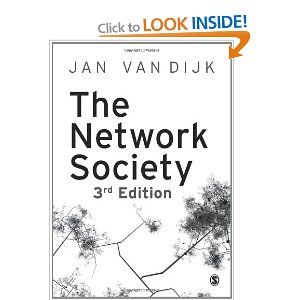Archive for the ‘social networks’ tag
Globalisation and Global Politics no comments
Having taken some time out to consult my current notes and research I came to the conclusion that there are three areas that still need more development before I will begin writing out my Interdisciplinary Review. I need to; gain an understanding of globalisation, find a stronger core-text discussing Politics and find a more comprehensive examination of Facebook. For this week’s post I will discuss my readings on globalisation and the remaining topics will be discussed in the order above in the subsequent weeks to come.
The No-Nonsense Guide to Globalization – Wayne Ellwood

This book provides a great overview of the basic notions involved in globalisation and global politics. Though the book does take a somewhat biased view (the author clearly has some anti-globalisation sentiments) the text is easily understandable and details much of the impact and direction of globalisation through recent history. It is written essentially as an American counterpart to the “Very Short Introductions” discussed previously.
Two notions in particular struck me as applicable to discussions of social networking. Firstly, Ellwood notes that the process of globalisation has changed over time. Means of travel, trade, and interaction (languages) have changed dramatically even in recent years and this has greatly modified the way in which globalisation takes place. There are some parallels between this idea and how social networking has integrated with peoples lives. Where previously computers were the terminal of access to your social network now phones, games consoles and various other extraneous devices such as cameras all provide similar or alternative means to access this network. Just as we see the process of globalisation changed by the advances in communication we may expect similar implication for the rates and direction of expansion seen in social networks as our interactions with these networks change. Before discussing the second point I will introduce the second book I have consulted on the topic of globalisation:
Globalization- A Basic Text – George Ritzer

This book provides a significantly more detailed approach to globalisation however, one recurring theme becomes apparent that is seen in both Ellwood and Ritzer’s books and across the topics of discussion within the context of globalisation: control.
Globalisation can be argued to be a positive tool of expansion but this also often results in restrictions being imposed on those that live beneath its shadow. Examples such as the “Tobin Tax”, a tariff charge used to impose restrictions on the flow of wealth between globalised and globalising peoples. Though originally intended to protect the interest of citizens this can also have negative effects by impinging on people ability to interact freely or restricting the ways in which they interact to only those interactions deemed “acceptable”. This theme is seen throughout discussions of globalisation particularly involving issues like imperialism. To what extent do emerging global powers control the restrict the development of global culture by imposing their own norms upon others? Does such a trend exist in social networks with popular networks buying up smaller ventures before they can compete or by forcing users to become dependant on their structure by tying multiple online identities to a single social network user account? Are these kinds of effects deliberate or the natural outcome of expansion? Do networks impose restrictions on each others use just as nations states do on their citizens?
Whilst globalisation provides one useful area of discussion within the context of politics I still feel that I need a stronger political text to support my discussion of the topic. The next post to come will be a discussion of this text.
Social Media no comments
This week I took a step back from the disciplines I have been studying and approached some literature on social media. My intention was not to become a social media expert but instead to approach the topic from the perspective of both sociology and politics. I read from one more technical textbook which examined both the structural nature and impact of networks within society; The Network Society by van Dijk, and one more narratively structured book centring on the beginnings, development and impact of the social media giant Facebook; The Facebook Effect by Kirkpatrick. Though both disciplines have a lot to say about each of the books I felt that certain topics and certain disciplines lent themselves well to providing comment on particular issues.
Structure and Sociology

The network society starts as a technically focused book and develops into an interesting sociological account of the impact of networks on everything from economics to social policy. With particular relation to the topics of social networking are the discussions of culture and psychology.
The book outlines a variety of perspectives on the cultural impact of networks and social media. This raises a common theme from the sociological literature with regards to technological v.s. social determinism i.e. whether peoples ‘use’ or technologies ‘structure’ and ‘purpose’ (if we take it to have explicit purpose) drives network development.
Equally, further points can be made with regard to the nature of modernity and social media; each country and even culture modernising at different rates and in different ways. It is not necessarily clear from the text how these interactions of different varieties of social media and/or what we might call the interaction of more ‘developed’ systems/networks have within the context of society. There is plenty of opportunity for interdisciplinarity here with both the social and political nature of Marxism offering some critiques within this context; in particular Weberian Neo-Marxism and it’s perspectivism.
Narrative and Politics

The Facebook effect documents the history of the site and it’s now famous owners. It would be impossible not to draw similarities between the formative processes which the site underwent and politics at large. Whether it be the questionable tactics used to obtain user informations paralleled with government spying for the “greater good” or the internal struggles between the site owners paralleled with every internal political dispute ever; the story of Facebook is undoubtedly one rife with politics. As is the case within the political discipline, Kirkpatrick does a fantastic job of historically recounting these ‘political’ struggles and disagreements even without explicit intention (though perhaps a little editorialised).
But, the book highlights an important feature of social networks and of politics often ignored on both accounts: politics (and Facebook) is not just about the relationship between those at the top and those at the bottom but with every individual at each level and everyone else. This of course provides substantial room for the discussion of the sociological factors that govern such complex interpersonal relationships.
Having reached this point in my reading I feel that I have a reasonable understanding of the basics of each discipline along with the topic I have chosen. My intention for the coming week is to return to my notes first and plan some aspects of my accounts of each discipline. When this process is complete the areas I find to be lacking in depth shall be the ones that are the subject of my further reading to come.
Slowed Progress But Marxism no comments
This week’s reading was somewhat disappointing. I had intended to get through more content however I found that much of what I was reading required a much deeper level of analysis to understand. For this reason, rather than exploring social networks or globalisation; I have focused more heavily on sociology and in particular one of the most famous thinkers to have influence the field: Karl Marx.
Both for Politics and for Sociology, Marx is held in very high regard. Despite how authors feel about the validity of Marx’s views; it is quite clear that most, if not all, commenter’s extend a degree of respect for the man regarding him as a thought leader both in his own time and beyond. Whilst I would have preferred a broader week of reading, the fact that Marx and Marxist theory exists so prominently both in sociology and politics I did not begrudge the topic the extra time I afforded it. I consulted two texts in particular.
Marx, Marginalism and Modern Society

This book offered a good introduction to Marx as a whole, in terms of both his contribution to politics and sociology. The thrust of the argument presented in this text is that Marx’s key contribution was his critique of the political economy. The author presents the case that whilst this was recognised to varying extents in politics and economics; sociological perspectives took longer to entwine themselves with Marxist viewpoints.
On reason for the eventually large scale adoption of Marxist theory within sociology is suggested to pertain to Marx’s views on materialism, in particular; Historical Materialism. The perspective argued that whilst history might have previously separated notions of personhood from thingness, history rather required a deeper account of interactions. For example, dissecting the “things” called institutions into the individual “people” they were made of. This view offers significant importance for sociology allowing far deeper consideration of the people that were previously amorphous entities. Many comparisons can be drawn between these notions and social networking. Not least because of the changing relationships such sites have had with their user bases over time but also at the level of individual users with the structural changes from simple lists of activity to Facebook’s features like “Timeline”. These most certainly can be argued to personalise “events” allowing them to become related much more closely to the individual they are associated with.
Classical Sociology

This book provided a good logical point of development for explaining the development of Marxist sociological theory. In particular it dealt with the ways in which Marxist theory has been modified or adjusted in what has been argued is a necessary process of modernisation.
This notion of modernisation does not reflect technological or social advancement explicitly but rather the sociological ideas about “modernity”. As before, this is essentially the view that different cultures/societies have modernised differently leading to “multiple modernities”. The author highlights that sociologists like Anthony Giddens have argued that modernity changes the social structure and as such requires a post-modern sociology. The means that only theories that account for such changes, only post-modern theories, are sometimes argued to be the only theories relevant to assessments of the modern world. This text’s author however, believes that Marxism exploits a loophole in this argument by way of the additional work done by one Max Weber.
The author argues that Max Weber’s neo-marxism, in particular the addition of Nietzsche’s perspectivism, is the key to incorporating Marxist theory into discussions of “modern” society. Perspectivism is the theory that the acquisition of knowledge is inevitably limited by the perspective from which it is viewed. This is infact a common view within sociology and has significant relevance to the nature of accounts of social networks. Does a persons experience of myspace or facebook vary if they are a “user”, a “business”, a “celebrity”, a “moderator”, a “site owner” and so on. When considered alongside political perspectives this is of course still deeply relevant. The nature of both a person’s position/perspective, the role that position/perspective implies and the power (or lack of power) that it entails all contribute the nature of the interactions they will experience.
For my reading this coming week it is my intention to focus on texts relating to social media. In particular The Network Society.
My Week Of Very Short Introductions no comments
In the previous week I listed several books on politics I was considering as reading for introductory texts. Having looked into each of these; I found they were either very dense in their content or too specific in their details to give a broad enough introduction. Having re-examined recommended pre-reading and undergraduate introductory texts I came across the Routledge “Very Short Introductions” books and the recommendation of one university of the “Very Short Introduction to Politics”.
My initial reading of this text has prompted my decision to change my topic of discussion from “cryptography” to “citizenry on social media”. Having decided on Politics as my topic area over Politics Science; this offers the ability to make a variety of historical comparisons and contrast the developments of states and their relationships with their citizens against the development of social media sites and their relationships with users.
The book gave a relatively detailed account of the varieties of social organisation that have been implemented throughout history ranging from ancient despotism and feudalism to modern dictatorships and democracies. There are clear distinctions to be drawn between different components of these organisations and the emergence of social media. However, it is interesting how the development of end-user agreements and the rights that they hold/with-hold have mirrored some aspect of the development of many political histories.
Not wishing to miss out on a greater level of factual content I also completed readings of “Very Short Introductions” to “Democracy” and “Communism” and intend to look briefly at “Socialism”, “Human Rights” and “The United Nations” to bolster my contextual knowledge. I have also looked into the further reading of undergraduate texts on globalisation with a view to contrasting the interaction and relationships of states with the interactions between and relationships of users with different social media sites.
This week I have also completed notes on the topics of:
Jean Baudrillard
Marxist Sociology
Ethnocentrism
Emile Durkheim
The Chicago School of Sociology
Critical Theory and
Post-Structuralism
I will be looking to do some study on the nature of social media this coming week along with developing my knowledge of “modernity” in sociology with a particular focus on the nature of Post-Modernism.
Self and business in social networks no comments
I was considering the two topics – social networks and consciousness from the perspective of Psychology and Marketing. But as I found later the more appropriate fields would be Sociology and Social Marketing.
After the class on Wednesday, one nice colleague boroughed me the book Social Psychology by Brehm, Kassin, Fein with the suggestion that I could also look into Sociology. As I was reading through this book and thinking about the topics, I came across the The Self-Concept which is just another term for self-consciousness. We can describe self-consciousness by looking at the main methods through it is achieved:
- introspection = looking inward at one’s thoughts and feelings
- perceptions of our own behavior = analyzing your own behaviour you can find out how you react in certain situations
- influences of other people = identifying yourself through comparison with others
- cultural perspectives – depending on the origin of the individual he might be an individualist (its values are independence, autonomy, self-reliance) or a collectivist (its values are interdependence, cooperation and social harmony)
So point 3. states that self-consciousness is influenced by others. In the Royal Society presentation called Understanding social and information networks given by Professor Jon Kleinberg: http://royalsociety.tv/rsPlayer.aspx?presentationid=499 the speaker shows the probability of joining a group based on the number of friends already joined:
The web is now a social phenomenon, it isn’t just a place to access and share information, it is a world of its own where people interact, live and change. This is an unprecedented phenomenon in human history.
And as the world changes, the way of doing business also shifts from the traditional marketing techniques to a more valuable, customized approach. A suitable quote from Socialnomics by Erik Qualman would be the following:
Marketer’s Philosophy Yesterday
- It’s all about the sex and sizzle of the message and brand imagery
- It’s all about the message; good marketers can sell anything
- We know what is right for the customer – we are doing the customer a service because they really don’t know what they want
Marketer’s Philosophy Today
- It’s important to listen and respond to customer needs
- It’s all about the product; it’s necessary to in constant communication with all the other departments
- We never know what is exactly right for the customer; that is why we are constantly asking and making adjustments
The topics that I touched in this post (and will in the next ones) were the self-concept and how it relates to the social-self, new ways of doing marketing taking into account this new type of individual. Until the next post, I will
- have a look into Sociology to understand the driving forces of social networks
- read more from the book Socialnomics because it describes how social media transforms the way we live and do business (this is actually the book subtitle)
- look into more social marketing books to find out the methods of doing business in this brave new world




